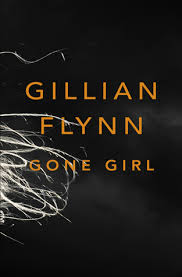 Quiz. Gone Girl: A Novel by Gillian Flynn was:
Quiz. Gone Girl: A Novel by Gillian Flynn was:
A. full of clever dialogue and witty prose
B. a work of structural genius
C. a painful example of how not to end a story
D. all of the above
D, dudes. D. Dang, damn, darn. Dogged, as my grandmother would say.
This was one of those books that had me running late because I couldn’t put it down. I sat over an hour in a tub of cold water, not realizing I had turned into a frozen prune because it was just that engrossing.
Until the end. Ugh! Flynn describes the bizarre relationship of Amy and Nick Dunne as “almost enjoyable, like gnawing on a cuticle.” That pretty much nails it. I chewed my fingernails down to the quick over how good the story was, only to be left with the dead weight of keratin disappointment in my gut and a bloody mess on my hands.
But there are 3,000 Amazon reviews covering that disappointment, so let’s focus on the good stuff, shall we?
There is some killer prose in here. Amy shares my ironic disdain for the happy world of television marketing:
The TV goes to a commercial for air freshener. A woman is spraying air freshener so her family will be happy. Then to a commercial for very thin panty liners so a woman can wear a dress and dance and meet the man she will later spray air freshener for.Clean and bleed. Bleed and clean.
And when Nick should have been mourning, he had this bitingly sarcastic thought about his missing wife’s “tenacious worry streak”:
Amy could spend an entire evening out fretting that she left the stove on, even though we didn’t cook that day. Or was the door locked? Was I sure? Because it was never just that the door was unlocked, it was that the door was unlocked, and men were inside, and they were waiting to rape and kill her.I felt a layer of sweat shimmer to the surface of my skin, because, finally, my wife’s fears had come to fruition. Imagine the awful satisfaction, to know that all those years of worry had paid off.
That’s not to say there weren’t dialogical snags. A man “left with his dick in one hand and a wild story about a frame up in the other” is witty enough. But a second guy finding himself in the exact same predicament a few pages later renders both dicks and storytelling only 50% virile. As a teacher I must remind everyone that 50% is failing. (Hopefully for their own comfort, neither of those men had ragged cuticles.)
But more good stuff! Another great tactic was changing the point of view between Amy and Nick every other chapter. The way the end of one narrative would connect to the beginning of the next was especially appealing. Nick would say, “I saw my wife on the floor of our kitchen… her head bashed in.” And the next chapter would begin with Amy saying, “I have never felt more alive in my life.”
“I wonder then if I have made a very big mistake.” — “I made a mistake.”
“Poor Amy.” — “Poor me.”
Her choice to link the chapters like this ensured that I would keep turning the pages to find out what happened next. I don’t know how in love with the unreliable narrator I am in general, but this story absolutely depended on both narrators being completely untrustworthy. And switching back and forth provided plenty of opportunities to go overboard with the little insults and injuries Flynn enjoys stacking up like a tower of not-quite-square blocks. We just know it all has to come crashing down eventually.
For example, a little thing like repeating “just one olive” was so endearing to Amy (“it was one of our many inside jokes”) while it left Nick mortified (“she brought it up over and over just to embarrass me”). We’ve had it happen so many times: he’s trying to compliment me and I think he’s being snarky. I’m joking but he takes it as a dig. He leaves his nail clippings on the coffee table and I take it as a personal attack. We each assume we know what the other is thinking, and we are both dead wrong.
Flynn has mastered the art of taking all of those misunderstandings that happen in any normal relationship and knotting them up into an impossibly tangled mess that wraps around your mind and won’t let you go. It’s an uncomfortable read because it hits a little too close to home sometimes. Could our relationship go that far off track? It’s like the proverbial train wreck— you don’t want to see it but you can’t look away. And you drive off shuddering, thinking that could have been us.
It’s too bad about the ending. Like getting a manicure that smudges before it’s dried. You’re left with a “meh” sort of feeling when really, the writing is polished and the story shines almost all the way through.
I heard Reese Witherspoon picked up the rights to produce a movie. It’ll be interesting to see if she can turn the ending into a satisfying nail biter.

I’ve heard mixed reviews about this book, and I’m still not sure if I want to read it. Hmmm.
LikeLike
I absolutely loved this book too! And I totally relate to that feeling of discomfort, like, are we okay? It’s important to remember that no matter how well you know someone, we are all maddeningly complex beings. I thought it was weak of him to take her back, though.
LikeLike
Great post. This has been on my ‘to read’ list for a while… I don’t think that your experience with it is an uncommon one.
LikeLike